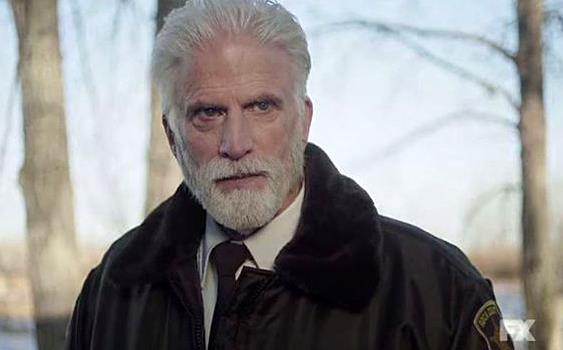Ted Danson on 'Fargo,' TV, and 'High Noon'

Ted Danson, who’s put on his parka and thermal underwear to join the second season of FX’s Fargo, has a simple suggestion for how viewers might orient themselves to the show’s sometimes-quirky world.
“With my character, it’s a little like High Noon,” he says.
Bet that wouldn’t have been your first guess.
Danson plays Sheriff Hank Larsson, the old-timer who helps his son-in-law Lou Solverson (with Patrick Wilson, below) unravel a deceptively complex murder in Sioux Falls, S.D. Hank comes across as the kind of wily veteran who thanks to a stoic nature and long years of law enforcement experience is surprised by nothing.
The other characters in the case sometimes get a little jumpier. So as they tangle themselves further and further in webs of their own spinning, Hank keeps putting one foot in front of the other.
At the same time, because this is Fargo, Hank has some peculiarities. He’s prone to apparent flights of distraction, latching onto seemingly bizarre tangential information that may later become critical or may simply help feed the show’s ongoing overlay of dark and wonderful humor.
“Usually I play silly, vain characters,” says Danson, who ensured his permanent place in TV history years ago as bartender Sam Malone on Cheers. “This is like old-fashioned comedy rolled into a more serious story about what happens when you don’t do the right thing in life.
“My character will still do the right thing.”
Just like, Danson adds with a smile, Gary Cooper’s Will Kane in High Noon.
So there it is.
Like most actors on most projects, Danson says it was the writing that drew him to Fargo. So he signed on to Noah Hawley’s new tale even knowing it meant leaving his warm California home to spend weeks and weeks of last winter in not-so-warm Calgary.
“I saw three scripts and I was in,” says Danson. “I loved the [1996] movie Fargo and I admit I was among those who wondered how it could be done on TV. But Noah won me over.”
Shooting in a place with a serious winter was essential, Danson says, “to give Noah and his people the ability to build this operatic symphony of bleakness.”
Once that visceral framework was established, says Danson, the actors’ work began, and Hank Larsson turned out to be “one of the hardest jobs I ever had.”
The show’s main mystery “is solved very quickly,” he notes, which means the audience has to become invested in “an extended character piece – and to make that part believable, we all had to depend on each other.”
It was a challenge in a good way, he says. “I loved going to work every day.”
Okay, he admits, and he also liked flying back home to L.A. for regular three-day weekends.
That enabled him to thaw out his fingers and was also consistent with what he sees as part of a natural downshift in his remarkably busy career.
“I want to keep working,” he says. “But I don’t want to reach the point where people see me and say, ‘Christ, you look like s---. What happened to you?’ ”
He adds that he’d also like to spend more time with his family and on causes like ocean conservation, which he promotes through the Oceana organization he founded almost two decades ago.
At the moment, he’s not the perfect poster boy for offloading professional involvement. Besides Fargo, he’ll also be seen this season on 13 episodes of CSI: Cyber, to which he moved after steering the last four seasons of the CSI mothership.
“I liked CSI (right) enough to want to continue with it,” he says, though he says it’s significant that he’s doing 13 instead of the traditional broadcast network 22.
“I won’t do a 22-episode show again,” he says. “I just don’t want to commit that much time.”
Happily, he sees more and more options in television for those who like the medium, but don’t like the fact that a 22-episode season requires nine months of shooting.
“It’s a great thing that’s happened with TV,” he says, alluding to the rapid rise of “limited series” like Fargo or shorter-season cable/streaming dramas like Homeland.
When done right, he says, a Fargo offers the best of both worlds – no open-ended commitment to a long series, yet more time than a theatrical movie to develop a story and characters.
“With Fargo, you have 10 hours,” he says. “Where else can you have that? A movie is two hours, so a writer like Noah might have to squeeze 15 minutes of story into 15 seconds. Here he doesn’t have to.”
That’s why, he says, a Fargo can attract actors like Season 2 costars Jesse Plemons and Kirsten Dunst.
“You can say to Jesse or Kirsten, come on, we can really tell this great story.
“You look at all the places you can do this now, networks like FX or places like Netflix and Amazon, and you can see why so many of us from the industry are coming to television.”
Danson is also fine, by the way, with other aspects of television’s contemporary revolution. Like binge-watching.
“I don’t blame people for binging,” he says. “It can be fun to watch that way. I did it with Downton Abbey. We watched the whole thing in about three days.”
Picking up, no doubt, more lessons in the importance of doing the right thing.